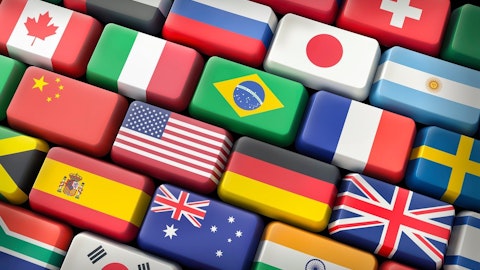Chegg, Inc. (NYSE:CHGG) Q4 2023 Earnings Call Transcript February 5, 2024
Chegg, Inc. isn’t one of the 30 most popular stocks among hedge funds at the end of the third quarter (see the details here).
Operator: Greetings and welcome to Chegg Inc’s Fourth Quarter 2023 Earnings Conference Call. At this time, all participants are in a listen-only mode. A question-and-answer session will follow the formal presentation. [Operator Instructions] As a reminder this conference is being recorded. It is now my please to introduce Tracey Ford, Vice President of Investor Relations and ESG for Chegg. Thank you, you may begin.
Tracey Ford: Good afternoon. Thank you for joining Chegg’s fourth quarter 2023 conference call. On today’s call are Dan Rosenzweig, Co-Chairperson and CEO; and Andy Brown, Chief Financial Officer. A copy of our earnings press release along with our investor presentation is available on our investor relations website investor.chegg.com. A replay of this call will also be available on our website. We routinely post information on our website and intend to make important announcements on our media center website at chegg.com/mediacenter. We encourage you to make use of these resources. Before we begin, I would like to point out that during the course of this call, we will make forward-looking statements regarding future events, including the future financial and operating performance of the company.
These forward-looking statements are subject to material risks and uncertainties and could cause actual results to differ materially from those in the forward-looking statements. We caution you to consider the important factors that could cause actual results to differ materially from those in the forward-looking statements. In particular, we refer you to the cautionary language included in today’s earnings release and the risk factors described in Chegg’s annual report on Form 10-K filed with the Securities and Exchange Commission on February 21, 2023, as well as our other filings with the SEC. Any forward-looking statements that we make today are based on assumptions that we believe to be reasonable as of this date. We undertake no obligation to update these statements as a result of new information or future events.
During this call, we will present both GAAP and non-GAAP financial measures. Our GAAP results and GAAP to non-GAAP reconciliations can be found in our earnings press release and the investor slide deck found on our IR website, investor.chegg.com. We also recommend you review the investor data sheet, which is also posted on our IR website. Now I will turn the call over to Dan.
Dan Rosensweig: Thank you, Tracy, and welcome, everyone, to our 2023 Q4 earnings call. To start, I am pleased to announce the appointment of David Longo as our new Chief Financial Officer, effective February 21, as Andy announced on the last call that he will be retiring. David has been our Chief Accounting Officer and Corporate Controller since coming to Chegg in 2021, and we look forward to his continued leadership in this new role. He is joining us on this call today. So welcome, David. . Now back to the business at hand. Chegg had a good quarter and exceeded our expectations. The last few years to have seen real challenges as we navigate the post-covid world. Despite those challenges, it’s actually an exciting time at Chegg, and I’m proud of the team and how they are navigating the complete reinvention of our company, leveraging the advancements in artificial intelligence and making it core to everything that we do.
In less than a year, we redesigned our entire user experience, developed our own large language models, launched automated answering, built proprietary algorithm to optimize the quality and accuracy of our exclusive content, and we began to compete more aggressively for new customers around the world. While early, our packaging, pricing and product strategy are yielding encouraging results for both students and our business. The process of embedding AI into every facet of Chegg’s platform is ongoing and iterative as we build a truly personalized learning assistant, a service that anticipates the student needs, adapts to their strengths and weaknesses and supports them academically, professionally and personally. There are numerous ways we intend to aggressively market our new product experience because the data tells us that once the student tries us, they will love us.
Internationally, we focused our biggest effort on testing promotional pricing to convert the millions of students who have entered the funnel but did not yet subscribe. Additionally, we are building sharing into our service to increase word of mouth, expanding our presence on TikTok, enhancing our SEO with increased questions from automated answers. Our business model benefits from more students asking more questions as we index those questions into search and other platforms to drive even more customers. Let me provide a little context. Since introducing automated answers in late December, we’ve seen a significant increase in the number of students asking new questions, as well as the number of questions per student. This is because our new automated service is delivering quality and accuracy, almost immediately, which is a huge benefit to students by building our own language models, along with our algorithms to check for quality.
Students can feel confident in what they are learning on Chegg and get support in real time. The impact has been immediate and significant. In January, Chegg’s automated answers delivered more than 2.2 million solutions to students, which is 3 times the number of new questions asked and answered at the same time last year. Importantly, as we scale to ensure we meet our standards of accuracy and quality, we expect to launch the rest of our proprietary models by the end of Q1. These models are being trained on Chegg’s data, and we are leveraging our 150,000 subject matter experts to optimize their solutions for learning. In education, students cannot afford the illusion of accuracy to learn. They need it to be correct, immediate and personalized.
We believe this is what Chegg can uniquely do for students and it’s a huge competitive advantage over generic AI models. The overall benefit of our new service to students is enormous, and there’s also significant benefits to Chegg. As the hype of AI dies down, leaders in their verticals like Chegg are taking control of their own destiny by building their own models, which allows for higher quality and lower cost. As an example, the cost to answer a new question using our own AI models is already more than 75% less expensive, and we believe it will continue to decline over time. This means we’ll be able to serve more students at a lower cost per student, faster and in more subjects and languages. We are confident in the value of our new product.
And because of that confidence and to be more competitive, we began testing promotional pricing in international markets in the middle of last year. We believe that if we could introduce our offerings to more global learners, they would find the value and benefit of Chegg and continue to choose us and stay with us. In Q4, we saw year-over-year new customer growth outside the U.S. for the first time in two years. And just as important for our business model, more of these users are taking the Chegg Study Pack, which is our higher-priced subscription and remaining paying customers for longer periods of time. We developed this pricing and packaging to be revenue neutral this year, while we expand new account growth substantially. While it is still early, we are seeing encouraging results.

Given the success of what we’ve seen internationally, we are now testing promotional pricing for new accounts in the U.S., which began in mid-January. As we have said, online learning support and skills-based learning are a huge market and they are only getting bigger. AI is still in its infancy, and our product road map is ambitious and exciting. Throughout 2024, we are introducing more AI-driven capabilities such as conversational chat, which continues to layer in personalization and interactivity for our learners. We also plan to integrate personalized learning tools such as practice questions, flash cards and study guides to our conversational learning experience. Looking beyond 2024, as AI automated translation gets better and cheaper, we plan to expand the localization of our offerings to non-English-speaking users.
We also plan to build out more AI capabilities within Chegg’s Skills and integrate pathways for students with assessments and other tools. We are already seeing a reduction in the time it takes to launch new skills programs by approximately 40%, which allows us to offer new courses at greater speeds and will significantly reduce our costs. And the importance of skills-based training has never been more critical. In fact, half of recent graduates are questioning how prepared they are to enter the workforce, given the disruption of artificial intelligence. And employers agree, a 79% say that workers need more training to work with AI more effectively. So the opportunity for Chegg Skills has never been greater or more important. There are a number of exciting opportunities ahead of us in 2024, and we remain focused on the following priorities: Returning to new account growth globally, maintaining strong margins and cash flow, rolling out the next phase of Chegg’s enhanced AI services and leveraging our momentum and skills for continued growth.
Every decade or so, the pace of technological innovation accelerates and new growth opportunities open up. The history of the Internet has shown us that vertical players who know their customer, have reach proprietary content and can provide a personalized user experience will win and win big. Given the strength of our brand, with over 90% of our customers reporting they are satisfied with Chegg service. we believe we are well positioned to do just that in our sector. Before I turn it over to Andy, I want to again thank him for all he has done for Chegg during his 12.5-year tenure. Under his guidance, Chegg grew from a physical textbook rental business to a global online learning platform. When Andy took the job, Chegg was in debt, unprofitable, and we had a single business model, renting textbooks.
Andy guided us through our transition to a fully digital business, and in doing so, grew our digital revenue from 0 to over $700 million annually. In his final full-year as our CFO, Chegg generated $222 million in adjusted EBITDA and $173 million in free cash flow. Thank you, isn’t enough to acknowledge the impact Andy has had on this company and on me personally. Andy, you leave quite a legacy at Chegg, and you will truly be missed. And with that, I will turn it over to you. Andy?
Andy Brown: Thanks, Sam, for those kind words, but more importantly, congratulations, David, on a well-deserved promotion, and I look forward to working with you as you transition into your new role over the next few weeks. Today, I will discuss our financial performance for the fourth quarter and full-year 2023, as well as our outlook for the first quarter of 2024. As Dan mentioned, we ended the year on a positive note. With total revenue, adjusted EBITDA and free cash flow all coming in above the high-end of our expectations. While the year had its challenges, we executed well on our plan to reinvent the way we help students navigate their learning experience by leveraging AI. And we continue to see strong profitability and cash flows.
This, along with the strength of our balance sheet, gave us the confidence to extinguish a significant amount of our debt at a discount and repurchase shares, which we believe have and will continue to enhance shareholder value. Looking more specifically at our 2023 performance, total revenue was $716 million, with subscription services declining 5% to $641 million. Total subscribers were $7.7 million, of which international subscribers were $2 million. Since 2021, International has increased from 11% of total revenue to 14% in 2023 or $100 million. And over time, we expect international to be even more significant. Skills and other revenue of $76 million, declined 20% year-over-year, while skills grew 55%, this was offset by the impact of exiting the textbook business in 2022.
We continue to take a prudent approach with expense management, and we were very pleased that we are able to deliver adjusted EBITDA margin of 31% or $222 million and free cash flow margin of 24% or $173 million, which represented 78% of adjusted EBITDA. We expect interest income to contribute less in 2024 from a combination of lower interest rates and a lower cash balance as a result of the aforementioned repurchases. Looking at Q4, total revenue came in above the high end of our guidance at $188 million, which drove better-than-expected adjusted EBITDA of $66 million. Subscription services revenue of $166 million declined 6% year-over-year, driven by a decline in subscribers which was partially offset by Chegg’s Study Pack take rate and a continued increase in retention.
Guilds and other revenue of $22 million declined 22% and as growth in skills was offset by the impact of exiting the textbook business. Looking at the balance sheet. We ended the year with cash and investments of $580 million and net debt of $20 million. This is the result of repurchasing $597 million of outstanding convertible notes during the year at a $92 million discount to par and initiating an accelerated share repurchase or ASR in Q4 of $150 million, which reduces our outstanding shares by approximately 12%. We believe this prudent capital management will enhance shareholder value. We exited the year with 103 million shares outstanding, including the majority of benefit from our most recent ASR. This represents a 90% reduction in shares outstanding versus 2022.
We believe our company is undervalued, as such, we will continue to look for opportunities to return value to our shareholders. Our business is somewhat unique given our subscription model in the life cycle of a student. While we are seeing encouraging signs in the business, it is too early to predict when we will return to revenue and margin growth. The green fuels in engagement, acquisitions and retention will take time to build our renewal base before we see a positive impact on total subscribers and revenue. In the meantime, we will continue to be prudent with expense management and prioritization while we continue to drive strong profitability and cash flows. With respect to Q1 guidance, we expect total revenue to be between $173 million and $175 million, with subscription services revenue between $155 million and $157 million.
Gross margin to be in the range of 73% and 74% and adjusted EBITDA between $43 million and $45 million. In closing, I am proud of what we have accomplished during my 12.5 years at Chegg. This is by a large measure, the best company I’ve worked for during my career. The mission, the culture and especially the team are second to none. And I want to thank everyone who is with me on this journey. In particular, a special thanks to Dan, for your leadership, mentorship and an especially the friendship we have developed. It means more than words can say. Thank you. I can also say with confidence that the future is bright for Chegg. And as a long-term shareholder, I look forward to seeing the many future successes the team accomplishes. And with that, I’ll turn the call over to the operator for your questions.
Operator: Thank you. Ladies and gentlemen, at this time we will be conducting a question-and-answer session. [Operator Instructions] Our first question comes from the line of Jeff Silber with BMO Capital Markets. Please proceed with your question.
See also 15 States With the Most EV Chargers Per Person and 15 Highest Quality Grocery Stores In The US.
Q&A Session
Follow Chegg Inc (NYSE:CHGG)
Follow Chegg Inc (NYSE:CHGG)
Receive real-time insider trading and news alerts
Jeff Silber: Thanks so much. Just wanted to confirm something you said in your remarks about rolling out, I think it was the new product experience other subscribers. And forgive me if I misheard you. I thought you said Q1 that would happen. Can you just confirm that? And is that included in your guidance and how so?
Dan Rosensweig: Yes. This is Dan. I’m not — yes, we are constantly rolling out the new capabilities that AI presents. But the big one that we wanted for the quarter, we did roll out already, which is automated answers. And what automated answers does is it allows us to almost immediately answer questions that either we used to have to send to a human at a much higher price or answer questions immediately that students wouldn’t ask because they didn’t want to have to wait until we actually gave them an answer. So we have seen a significant increase in the number of students asking questions and the number of questions per student. So we I think we answered over 2 million additional questions than we got last year at the same time this year.
So that was the big move for this semester. The other ones will roll out over the course of the year, but this is the one that we think has the most meaningful impact in the near-term, because not only will it improve retention, but it will improve traffic and overall conversion and growth rates. So it’s the flywheel that Chegg built itself on, but this is a dramatic acceleration of that. So I think what you may be thinking is when we said we were going to roll out promotional pricing in Q1 in the U.S. as a test.
Jeff Silber: That’s probably what I was referring to, and that’s actually my second question. Can you talk about the order of magnitude of the promotional pricing that you’ve already rolled out internationally? And give us some framework of what we should be expecting in the U.S.?
Dan Rosensweig: Yes. So internationally, we started testing this last June. And our ambition, our belief was that as more students try Chegg that they would — that they would love it and retain because for the first time, we’re competing against a large named competitor, ChatGPT, which has turned out is less of a competitor than we were concerned with, and that’s really good news. And that is because they give an illusion of accuracy, but it’s not accurate and students cannot afford to have inaccurate incorrect information, plus they don’t go there to learn, they actually come to Chegg to learn. And in order to actually master your subject, you have to learn it. So we’re built specifically for this, they are not. And so the more students that came to us and tried us, the longer they started to stay.
So we rolled out promotional pricing there because we wanted to compete more aggressively for students that have never had a chance to before. And that resulted in substantially higher conversion rate of people that were already in the funnel of which we have millions that come in and register, but had yet to convert. And so this is beginning to pick up a number of them. Second, on average, they’re staying substantially longer than they did before, so they’re retaining longer. So all the things that we wanted to see, plus they’re taking higher take rate of the more expensive product. So for outside the U.S., we’ve already returned to new account growth, and we expect to return to revenue growth much faster there because of just the volume of new accounts that we’re able to bring in.
So that gave us the confidence in the U.S. to want to test something similar to this. Now the percentage of discounts outside the U.S. are higher than they are in the U.S. The U.S. discounts that we’re testing are promotional pricing. They range about 25% to 35%. And we have the opportunity to raise them back to full price whenever we think it’s appropriate, if that makes the most sense to do. So we’re testing that to a percentage of our new customer audience in the U.S. only. This does not affect any of the existing business, and the existing revenue. We have ways to block cannibalization. This is a new customer promotion only. And so the test range from 25% to 35%. And it’s only been three weeks, but the results so far in terms of what’s measurable which is conversion is up.
And take rate is up. The next big metric that we want to look at before we determine which of the test makes the most sense because we’re running three different prices in five different variants because we like to do things and know the answer to it before we roll it out to the full audience. So right now, so far, so good, but we have a couple of weeks more to go to see how retention works in month one, month two, month three and then depending on what that yields, we can determine if, when and how much we want to roll out in new promotional pricing for the second half of the year. But so far, a really good result. And outside the U.S., really good results.
Jeff Silber: Alright. Thanks so much for the color and Andy again thanks for all your health and best of luck.
Andy Brown: Okay, thanks, Jeff.
Operator: Our next question comes from the line of Doug Anmuth with JPMorgan. Please proceed with your question.
Bryan Smilek: Hey, it’s Bryan Smilek on for Doug. Thanks for taking my questions. Just to start on international. Can you just talk a bit about more what drove the inflection back to growth there and what the next steps in international are. And I guess just on a market-by-market basis, did anything stand out in particular? Or was it just broad-based recovery?
Dan Rosensweig: Yes. So what drove it there was, what drove it and what’s driving it are going to be a combination of the brand-new product experience. So the way our business grew initially and so large. You got to remember only a few years ago. In 2019, total revenue for our subscription services was in the $200 million range. Now it’s close to $700 million range, so we have grown quite substantially. The challenge was we grew so much during COVID. And now we’re coming back down to the realization of where we — where the base is that we can grow from. And we believe that, that’s what we’re experiencing this year. So outside the U.S., the new pricing promotion allowed people who were nervous about trying Chegg because we’re not as well-known there, to cross the chasm and then ultimately subscribe.
And because the price is — promotional price is lower, they’re actually staying on longer, which is exactly what we hope for. On top of that, the long-term flywheel is the way Chegg works is the more customers we have and the more new questions that they ask, not ones that are in their existing database of 100 million already, but new ones that they ask, they then get indexed into search around the world, depending on which country they came from. And then other students search and they find them and then they come into Chegg. So we’re seeing an improvement in traffic, traffic from new questions and then holding our conversion rate. So that’s — those two things together, which is promotional pricing and the ability to rebuild the flywheel, those are driving the new growth, and they’re just driving a faster outside the U.S., because it was a smaller base in which to start from.
But we are anticipating that we’ll see the same kind of success inside the U.S., a combination of the new product. When students are asking last January, a year ago January, we had about 500,000 new questions that we were able to answer on behalf of students, all of them went out to humans. This year, we had the same number that went out to humans, but we had another 2 plus 2 million that went out that we were able to answer through automated answering, which is our big AI move to start with the high quality, and that’s driving more traffic and more conversion to check. So that’s a bigger hole that we need to fill, but we’re on our way to filling it.
Bryan Smilek: Got it. And did any market stand out in particular? Or was it just broad-based recovery?
Dan Rosensweig: Yes, no it’s, it’s everybody has done a lot better outside the U.S., but we’re starting on very different bases. So the larger bases are the English-speaking countries because everything we initially did was in English, but one of the other real benefits of AI, so AI is moving from a headwind to a tailwind for us because it’s allowing us to build a better product, allow students to ask more questions, answer them faster, index them, get more traffic and convert more traffic and because our quality is unique, and we work with our own large language models rather than external models, the cost of it is substantially less. So as more countries come online and more students can ask in more languages because translation will really be towards the end of the year and into next year because AI will allow for automated translation, — so in terms of growth rates, you see countries like India finally taking off for us.





